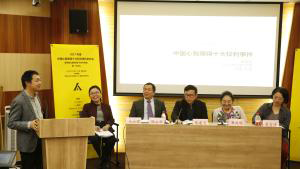CEAS Faculty Spotlight: Zhiying Ma
PUBLISHED ON FEBRUARY 21, 2022
Born and raised in South China with a physical disability, in a family heavily impacted by various disabilities and chronic illnesses, Professor Zhiying Ma has long been interested in these questions: how does the body—its health, illness, capacities, and disabilities—become a site for ethical practices and politics of governance in China? More generally, how do the body and its vicissitudes in such a rapidly changing political context help us understand our shared vulnerability, dependency, and aspiration for dignity as human beings? She pursues these questions through an interdisciplinary approach that brings together cultural and medical anthropology, disability studies, gender studies, and science and technology studies.
Professor Ma’s first project, entitled “Intimate Institutions: Psychiatry, Family, and the Mental Health Legal Reform in Contemporary China,” interrogates families’ involvement in the care and management of persons diagnosed with serious mental illnesses in China. Over the last three decades, most psychiatric inpatients in China were hospitalized against their will, by their families. Despite intense public discussion on patient rights, the first national Mental Health Law, passed in 2012, reinforces families’ rights and responsibilities in patient management. Professor Ma examines why families continue to occupy such a critical role in psychiatry, and what this involvement means for the country’s ethics, affects, and political economy of care and population governance. To those ends, she has done 32 months of fieldwork in psychiatric hospitals, social work agencies, family support groups, and human rights agencies, as well as interviewing policymakers and conducting archival analysis.
Her fieldwork shows that the family’s central role in psychiatric care is conditioned by the privatization of welfare in market reform, the biomedical logic that equates care with institutionalization and medical surveillance, and the rising security apparatus that requires intimate monitoring of potential social disruptions. This discursive and institutional constellation, or what she calls “biopolitical paternalism,” has produced injuries and ethical unease within families, aggravated health disparities across the population, and also generated opportunities for resistance. Professor Ma has published some of these findings in Cultural Anthropology, HAU: Journal of Ethnographic Theory, Medicine Anthropology Theory, among others. The book manuscript based on this project is under contract with Duke University Press.
As a follow-up to this research, Professor Ma has been tracing the (re-)emergence of community mental health in China. Here she focuses on ideologies of "community" in the country's ongoing social transformation and welfare reconstruction, dynamics between social services and population management, and processes of global knowledge translation. To center the voices and experiences of people with psychiatric disabilities in service design and delivery, and to break the cycle of institutionalization, she has worked with stakeholders in China to develop a mental health peer support program using a community-based participatory research approach. In the next few years, the program will be standardized and scaled up with the generous support of the Cyrus Tang Foundation.
Besides mental health, Professor Ma’s research also concerns persons with other disabilities in China. Working with local activists and organizations, she has studied blind persons’ struggles for inclusive college education, experiences with sport and exercise among women with physical disabilities, and the needs of rural children with disabilities and their caregivers, among others. She is also working with students to examine the impact of public health measures against the COVID-19 pandemic on persons with disabilities and other vulnerable populations in China and beyond.
These research insights allow Professor Ma to advocate for the rights and wellbeing of persons with disabilities and other marginalized populations. She has written popular articles and spoken on the media to promote disability-friendly policies and disability studies in China. She has facilitated the networking of disability-related NGOs, and has participated in many high-level disability rights dialogues in and beyond the country. She has also consulted for various development projects on livelihood support, gender equality, social inclusion, and civil society participation for persons with disabilities. Because of her deep commitment to fight inequality as a scholar-activist, she was named a 2021 Ford Global Fellow.
Zhiying Ma is Assistant Professor at the University of Chicago Crown Family School of Social Work, Policy, and Practice.
Read more about the CEAS Faculty Spotlight series.
 THE UNIVERSITY OF CHICAGO
THE UNIVERSITY OF CHICAGO



